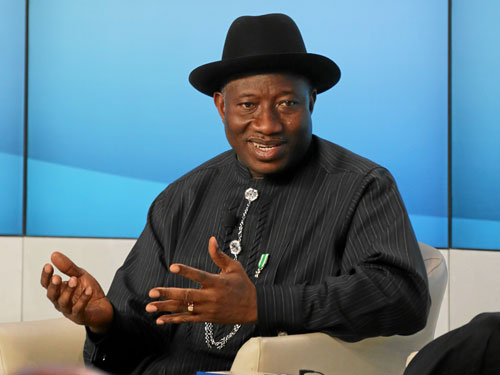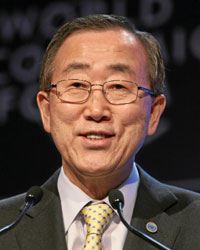Posted by Kent Klindera on January 17, 2014

President Goodluck Jonathan signed the Same-Sex Marriage Prohibition Act on January 7. (Photo: World Economic Forum)
Last week, Nigerian President Goodluck Jonathan ignored local and international pressure and signed one of the world’s most discriminatory pieces of legislation related to LGBT rights. In early December, I visited Abuja, Nigeria, to attend a national conference on new HIV prevention technologies. It was an excellent conference that challenged Nigerians within government and civil society to increase their commitment to biomedical HIV prevention efforts, such as increasing antiretroviral access for people living with HIV to reduce their viral load, and thus reduce the likelihood they can pass HIV on to others.
A large portion of the conference focused on programming and services for key affected populations—including, of course, gay men, other MSM and transgender (GMT) individuals. Nigeria has the world’s second largest HIV epidemic and study after study presented indicated that in Nigeria, as in so many African countries, a high percentage of GMT folks are infected with HIV and clearly in need of greater attention. Government representatives from the Ministry of Health were very receptive to improving their HIV programming to better serve GMT, and I left Nigeria with a lot of hope for a bright 2014.
 UN Secretary General Ban Ki-moon denounced the law, stating it would “fuel violence." (Photo: World Economic Forum)Now, on a daily basis, I am receiving word of LGBT individuals being hunted, arrested, and persecuted by police and vigilante groups. Same-sex sexual conduct is already illegal in Nigeria, but the “Same-Sex Marriage Prohibition Act” extended that criminalization by making any persons involved in a same-sex wedding, even those who attend, subject to arrest. It also outlaws LGBT organizations—the very same organizations that are part of a core strategy being used by the National AIDS Commission to address HIV in the country. Millions of dollars have already been invested in these organizations, with most of it coming from USAID, the Global Fund to Fight AIDS, Tuberculosis and Malaria, and other international donors—all for naught, it now seems.
UN Secretary General Ban Ki-moon denounced the law, stating it would “fuel violence." (Photo: World Economic Forum)Now, on a daily basis, I am receiving word of LGBT individuals being hunted, arrested, and persecuted by police and vigilante groups. Same-sex sexual conduct is already illegal in Nigeria, but the “Same-Sex Marriage Prohibition Act” extended that criminalization by making any persons involved in a same-sex wedding, even those who attend, subject to arrest. It also outlaws LGBT organizations—the very same organizations that are part of a core strategy being used by the National AIDS Commission to address HIV in the country. Millions of dollars have already been invested in these organizations, with most of it coming from USAID, the Global Fund to Fight AIDS, Tuberculosis and Malaria, and other international donors—all for naught, it now seems.
What amazed me about the conference I attended was the attendees’ passion about developing one of the strongest AIDS responses in Africa. Speaker after speaker, as well as government dignitaries and activists in the audience, expressed their commitment to a coordinated and compassionate response to HIV in Nigeria. This new law is a complete slap in the face to those dignitaries, speakers, and activists, and a complete waste of donor aid monies already invested in a fragile HIV response.
What is even more shocking is the lack of response from national leaders within the Nigerian health and human rights community. Global leaders, including UN Secretary General Ban Ki-moon, U.K. Prime Minister David Cameron, U.S. Secretary of State John Kerry, Global Fund Executive Director Mark Dybul, and many others, have demanded justice and that the Nigerian Supreme Court strike down the law—as well as an explanation for the global AIDS funding that is being wasted.
Where is the Nigerian leadership?